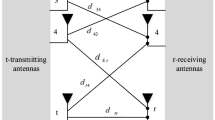Abstract
Multiple input multiple output (MIMO) systems showed good utilization of channel characteristics. In MIMO systems multiple signals are transmitted using multiple antenna system. This provides each receiver the combined signals and hence, array processing techniques helps in reducing the effects of interference among them. In this paper we devise the use of pre-coded MIMO system to reduce the effects of frequency selectivity and hence, enhance the systems capacity and/or reduce the bit error rate. In this technique we introduce a temporal pre-coder on each antenna signal; this creates a deterministic multi-path signals similar to signals received when the channel is multi-path fading channel. The same antenna signal will arrive at each receiver forming orthogonal sub-space and the receiver will be simple add and delay of the received signals. Ant colony optimization is used in this paper to select the best pre-code. Results showed that we can diagonalize the channel matrix and practically eliminate the interference for frequency selective fading channel. Simulation of two transmitting two receiving antennas pre-coded MIMO system showed that the capacity can be doubled.
Similar content being viewed by others
References
Gilhousen K.S., Jacobs I.M., Padovani R., Viterbi A.J., Weaver L.A. Jr., Wheatley C.E. (1991) On the capacity of cellular CDMA system. IEEE Transactions on Vehicular Technology 40(2): 303–312
Viswanath P., Tse D. (2003) Sum capacity of the vector Gaussian broadcast channel and uplinkdownlink duality. IEEE Transactions on Information Theory 49(8): 1912–1921
Ayman F.N., Paulraj A., Kailath T. (1994) Capacity improvement with base-station antenna arrays in cellular CDMA. IEEE Transactions on Vehicular Technology 43: 691–698
Vishwanath S., Jindal N., Goldsmith A. (2003) Duality, achievable rates and sum capacity of Gaussian MIMO broadcast channels. IEEE Transactions on Information Theory 49(10): 2658–2668
Choi W., Andrews J. G. (2007) Spatial multiplexing in cellular MIMO-CDMA systems with linear receivers: Outage probability and capacity. IEEE Transactions on Wireless Communications 6(7): 2612–2621
Dong, W., Li, J., & Lu, Z. (2009). Parameter estimation for correlated MIMO channels with frequency-selective fading. Wireless Personal Communications. doi:10.1007/s11277-009-9664-9.
Rosson P., Chenu-Tournier M., Noguet D. (2006) A Baseband demonstrator using multi antenna techniques to improve capacity of fixed broadband wireless access. Wireless Personal Communications 36: 317–338
Burg, A., Rupp, M., Haene, S., Perels, D., Felber, N., & Fichtner, W. (2003). Low complexity frequency domain equalization of MIMO channels with applications to MIMO-CDMA systems. IEEE 58th Vehicular Technology Conference 1 (pp. 468–472). VTC 2003-Fall.
Fan Y., Thompson J. (2007) MIMO configurations for relay channels: Theory and practice. IEEE Transactions on Wireless Communications 6(5): 1774–1786
Harju L., Kuulusa M., Nurmi J. (2005) Flexible implementation of a WCDMA rake receiver. Journal of VLSI Signal Processing 39: 147–160
Rashid F., Peh H. H., Manikas A. (2008) Diffused channel estimation and reception for cyclic prefix-free MC-CDMA arrayed-MIMO communication systems. International Journal of Wireless Information Networks (IJWIN) 15: 148–160
Çolakoglu M. K., Safak M. (2007) On the MIMO channel capacity predicted by Kronecker and Müller models. Wireless Personal Communications 47: 91–100
Busche H., Vanaev A., Rohling H. (2008) SVD-based MIMO precoding and equalization schemes for realistic channel knowledge: Design criteria and performance evaluation. Wireless Personal Communications 48: 347–359
Proakis J. (2001) Digital communications (4th ed.). McGraw-Hill, New York
Lee W. C. (1998) Mobile communications engineering, theory and applications (2nd ed.). McGraw Hill, New York
Rappaport T. S. (1996) Wireless communications, principles and practice. Prentice-Hall, Englewood Cliffs, NJ
Simon M. K., Alouini M. S. (2005) Digital communication over fading channels (2nd ed.). Wiley, New York
Gershman A. B. & Sidiropoulos N. D. (Eds.). (2005). Space-time processing for MIMO communications. New York: Wiley.
Ho S.L., Yang S., Wong H.C., Cheng K.W.E., Ni G. (2005) An improved ant colony optimization algorithm and its application to electromagnetic evices designs. IEEE Transactions on Magnetics 41(5): 1764–1767
Quevedo-Teruel O., Rajo-Iglesias E. (2006) Ant colony optimization in thinned array synthesis with minimum sidelobe level. IEEE Antennas and Wireless Propagation Letters 5: 349–352
Author information
Authors and Affiliations
Corresponding author
Rights and permissions
About this article
Cite this article
Rahhal, J.S., Abu-Al-Nadi, D.I. Pre-Coding for MIMO Systems in Frequency-Selective Fading Channels. Wireless Pers Commun 55, 591–605 (2010). https://doi.org/10.1007/s11277-009-9821-1
Published:
Issue Date:
DOI: https://doi.org/10.1007/s11277-009-9821-1




